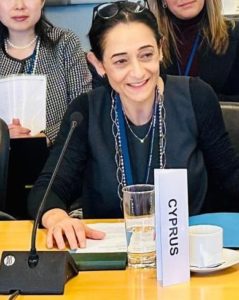 High-level side event “Engaging men and boys: Showcasing Spotlight Initiative – a high-impact model for accelerating progress towards the Sustainable Development Goals”
High-level side event “Engaging men and boys: Showcasing Spotlight Initiative – a high-impact model for accelerating progress towards the Sustainable Development Goals”
14 December 2023, European Union
Your Excellencies,
Dear colleagues,
First, allow me to express our appreciation to the Delegation of the European Union for convening this meeting today, and extend my gratitude to all panellist for their valuable contribution on the important issue of engaging men and boys on ending violence against women and girls.
Since this is my first meeting as the new Permanent Representative of Cyprus to the United Nations, allow me to reiterate that prevention and combating of all forms of violence against women and girls is within the highest priorities of the Government of Cyprus.
Elimination of violence against women and girls is a key commitment of the 2030 Agenda for Sustainable Development. Nevertheless, and despite positive steps and progress made in recent years, we are lacking behind our goal to achieve gender equality. The challenges are many and it is indeed worrisome that at this critical midpoint, none of SDG 5 “Gender Equality” indicators are at “target met or almost met”, according to the latest gender snapshot report on SDGs progress.
It is undeniable that gender inequality is deeply rooted in stereotyped gender roles and historic inequalities which perpetuate the problem. Violence against women and girls, is not an exception, taking into consideration that the majority of acts of violence are perpetrated by men.
Allow me to specifically touch upon gender-related killings, the most brutal and extreme manifestation of violence against women and girls. Numbers are alarmingly high. According to statistics, in 2021, 45,000 women and girls were killed intentionally by their intimate partners or family. The most dangerous place for some women and girls, is their home.
I would like to contribute to our discussion with 4 points that are important in addressing the root causes of patriarchy and dominant norms around the roles and behavior of men and boys related to violence against women and girls: that is 1) the need for a strong legislative framework, 2) the role of prevention policies and programs, 3) the role of education and 4) media.
Adopting a comprehensive legislative framework for preventing and combating violence against women is a sine qua non. An example from our national perspective is the adoption by the Cyprus’ Parliament -last summer- of a law on femicide. The law, the first of such piece of legislation in Europe, is integrating femicide into the Criminal Code as a distinct crime, rendering gender-related killings as an aggravating factor when imposing sentences.
Nevertheless, deterrence through criminalization of violence against women and girls is not a panacea. We need to work on addressing prevention efforts, specifically targeting men and boys, to transform the gender attitudes and norms that facilitate and drive violence against women and girls, engaging them as vocal advocates to prevent such violence.
In this regard, a program under the name “Proteas” has been established in Cyprus, targeting specifically perpetrators of domestic violence. It is addressed to adults exhibiting violent behaviors within the family, with an aim to enhancing the understanding of violent behavior, taking responsibility and the consequences of violent acts, preventing violent behaviour, and creating the incentives for change.
Undeniably, education is the pathway towards gender equality and raising awareness on the elimination of violence against women and girls. A rights-based approach to education can promote tolerance and understanding, leading the way to creating peaceful societies. Systematic training of teachers on gender equality issues as well as the promoting of comprehensive sexual education at all levels of education, are only some steps in the right direction.
Lastly, we should not omit the role that media have to play in shaping perceptions, opinions and behaviors, as well as deconstructing stereotypes. The systematic training of journalist and media professionals in gender mainstreaming, promotion of gender equality and the elimination of all forms of violence against women and girls, is crucial in transforming societal gender attitudes and norms.
To conclude, it is important that spaces to foster conversations on gender equality and against gender-based violence are encouraged in all spheres of society. Men and boys can be key players in dismantling violence tolerance and gender inequality, importantly contributing to the elimination of violence against women and girls. It is imperative to note that a gender-equitable society where respectful relationships are the norm and not the exception, will benefit all members of society regardless of gender, leading the way towards achieving the Sustainable Development Goals.
I thank you.